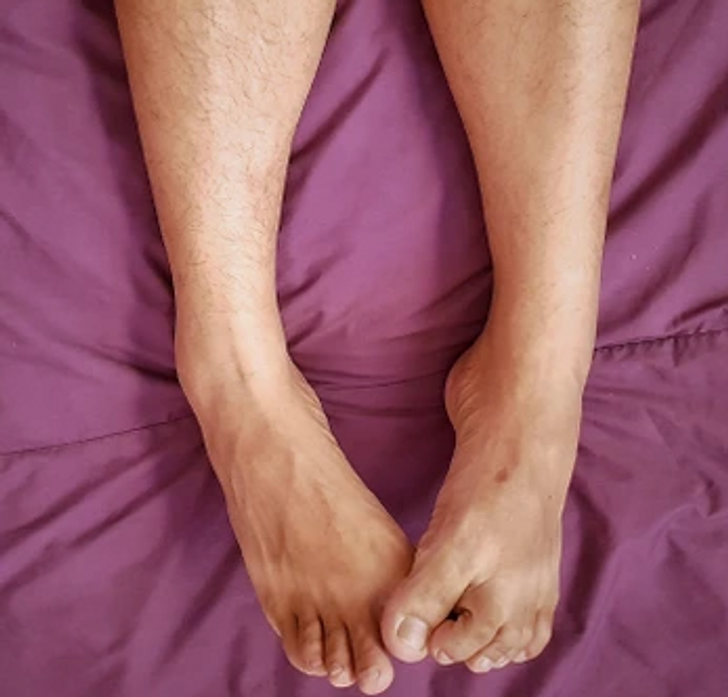I think, I can never earn over which I paid by my precedent employer, but I was wrong, world is so large to try their fate. but now I am making $52/h even more,and easily earn minimum $1300/week, on the experience everyone must try to do work online, easy way to earn, here's an example.
𝐰𝐰𝐰.Richnow05
10 Signals Your Body Sends to Tell You Something Is Wrong
Our bodies are incredibly intelligent, often providing us with subtle clues when something isn’t quite right. From minor discomforts to more pronounced symptoms, these signals serve as valuable indicators of our overall health. In this article, we’ll explore ten ways your body may be trying to tell you that something is amiss.
Content is provided for informational purposes only and is not intended as a substitute for medical advice. Seek guidance from your doctor regarding your health and medical conditions.
1. Itching sensations
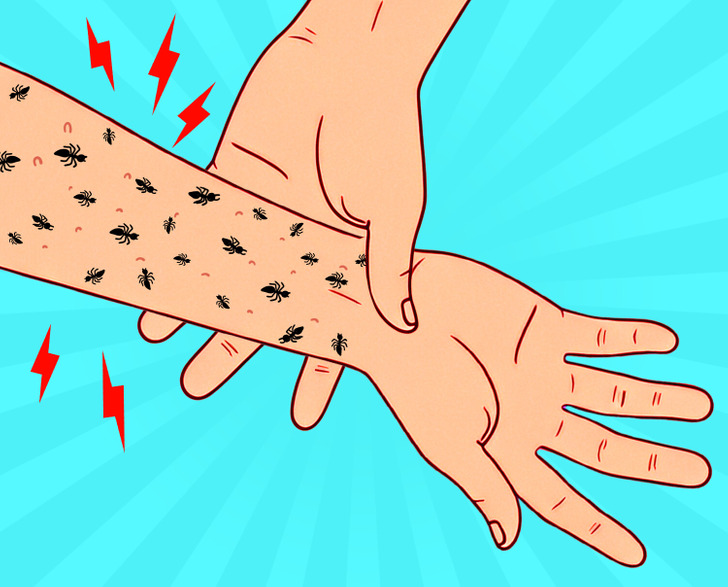
Why do you feel itchy all over?
- More than 1 in 10 pregnant women have itching. It’s usually not harmful and is caused by skin stretching and hormones. But if it gets worse at night, it could be a sign of something serious. Tell your doctor if you’re itching so they can check if you need tests.
What else can cause itching all over?
- Skin problems like dry skin, eczema, psoriasis, scabies, burns, scars, insect bites, and hives.
- Internal illnesses like liver or kidney disease, anemia, diabetes, thyroid issues, and some cancers.
- Nerve issues such as multiple sclerosis, pinched nerves, and shingles.
- Mental health conditions like anxiety, OCD, and depression.
- Irritation and allergies from things like wool, chemicals, soaps, or certain medicines.
2. White tongue
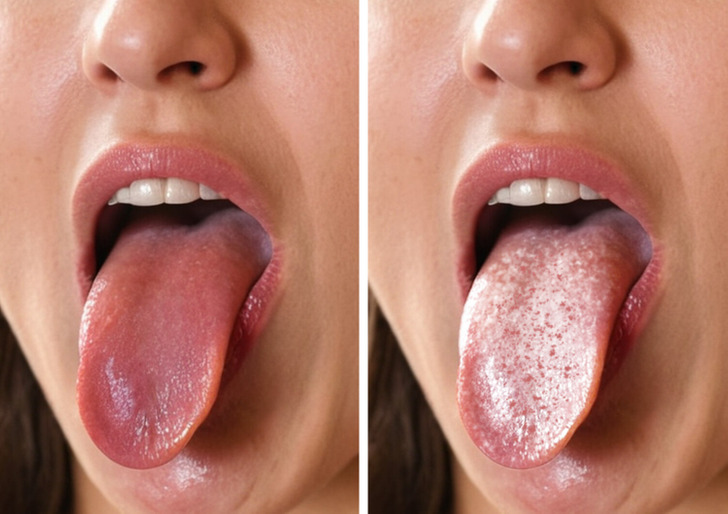
White tongue occurs when a white coating develops on part or all of the surface of your tongue. It can be accompanied by symptoms like bad breath, a hairy tongue, and irritation.
Causes can be:
- Neglecting oral care, like not brushing, flossing, or cleaning your tongue often.
- Bad habits.
- Using dentures or injuring your tongue with sharp objects.
- Taking antibiotics, which can cause yeast infections in the mouth.
- Having a diet lacking in fruits and vegetables and high in soft foods.
- Breathing through your mouth.
- Experiencing dry mouth due to medical conditions or certain medications, such as muscle relaxers or cancer treatments.
- Oral thrush, also known as oral candidiasis, is a condition where the fungus Candida albicans builds up on the lining of your mouth. While Candida is typically present in the mouth, it can sometimes overgrow and lead to symptoms.
3. Muscle twitches
Sometimes your muscles act on their own, without you telling them to. They might twitch or contract and have trouble relaxing. Twitches and spasms are most common in areas like your thighs, calves, hands, arms, belly, ribcage, and the arches of your foot. Doctors aren’t always sure why they happen, but a few things can trigger them.
- Your muscles need minerals like potassium and magnesium to work properly.
- Not drinking enough fluids can make your muscles more likely to twitch and spasm.
- Having too much caffeine can also cause muscle twitches in different parts of your body.
- If you have high blood pressure or heart disease, your doctor might prescribe water pills, which make you pee more. This can lower your potassium levels and lead to muscle spasms.
- When nerve cells are damaged, it changes how they talk to each other and to the brain. Twitches and spasms can be warning signs that this common condition is affecting the nerves that control your muscles.
4. Stool as rounded balls
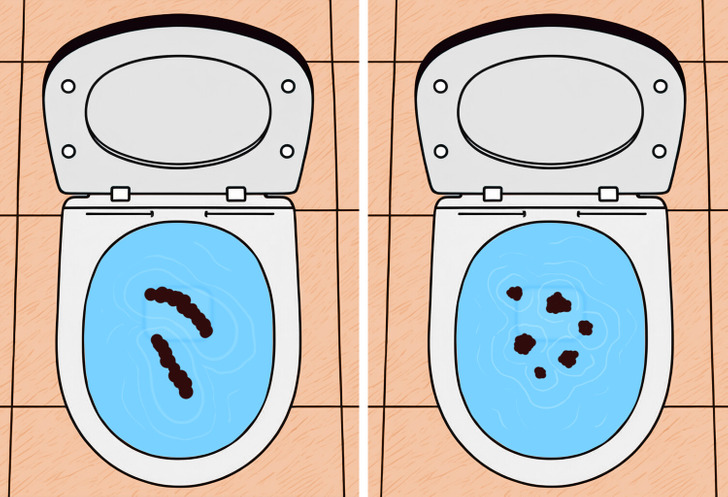
Some things that might make constipation more likely include:
- Feeling worried: Kids and little ones might not go to the bathroom when they’re anxious or if something big changes at home or in their bathroom routine. When parents or caregivers are strict or pushy about toilet training, some kids might hold in their poop.
- Taking certain medicines: Some medicines or pills and stuff like that might make constipation worse. These can be things like antacids, some painkillers, and meds for other conditions like Parkinson’s disease.
- Tummy troubles: If someone has issues like irritable bowel syndrome (IBS) or other stomach problems, they might get constipated. Sometimes, certain foods can also make people feel blocked up.
- Getting hurt: If someone hurts their back or muscles in their belly area, like when having a baby, it might be tough for them to poop. This can slow down how food moves through the body and make poop come out like little pebbles.
- Having a long-term sickness: Some health problems, like diabetes or thyroid issues, can mess with how the nerves and muscles work and make it harder to go to the bathroom.
- How you live: If you don’t move around much or don’t have much activity, you might have a higher chance of getting constipated. Other things like being pregnant, going on a trip, or changing what you eat can also lead to constipation.
- Eating habits: Not eating enough foods with fiber or not drinking enough water can make poop come out like little balls and make it hard to go to the bathroom.
5. White pupil
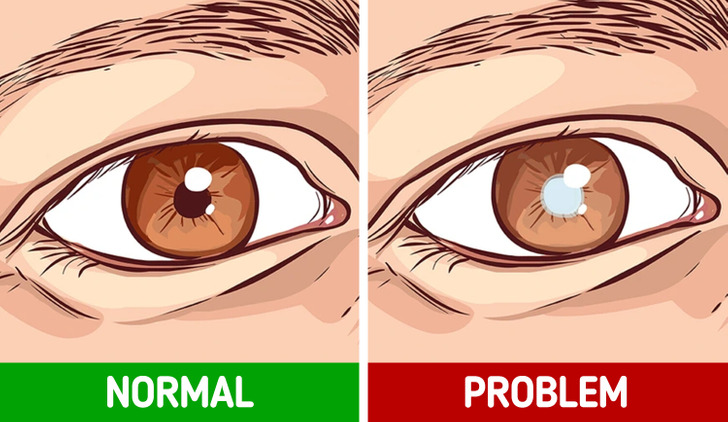
Leukocoria means «white pupil,» and it happens when the pupil of your eye looks white instead of black. It’s more common in kids but can also happen to adults. There are lots of different things that can cause leukocoria, so it’s important to see an eye doctor right away if you notice it. Some things that can cause leukocoria include:
- Cataracts: These are cloudy areas in the lens of your eye that are common as you get older and can be fixed with surgery.
- Retinal detachment: This is when the thin tissue at the back of your eye, called the retina, comes loose. It’s an emergency and needs treatment right away.
- Endophthalmitis: This is an infection inside your eye that needs urgent medical attention. It can lead to blindness if not treated quickly.
- Coats’ Disease: This is when the blood vessels inside your eye become abnormal, causing leaks and buildup of fluid. It can lead to retinal detachment.
- Retinoblastoma: This is a rare type of eye cancer, mostly seen in kids. Leukocoria is one of its main symptoms, along with poor vision and other eye problems.
- Power difference: Sometimes, one eye might look different because it has a different power than the other one. This isn’t usually serious and can be fixed easily.
6. Pale nails
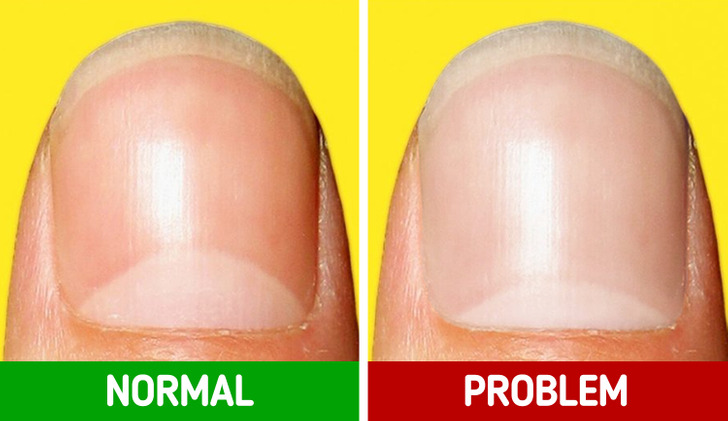
Are your nails pale or white? This might indicate a low red blood cell count. White nails can also suggest various conditions such as trauma, liver disease, diabetes, an overactive thyroid, heart failure, heavy metal poisoning, chemotherapy, or a lack of nutrients in your diet.
If your nails are mostly white with a thin pink strip at the tip, you might have Terry’s nails. This condition can occur as a result of aging, but it could also be a sign of underlying health issues such as diabetes, kidney, liver, or heart disease.
7. White finger
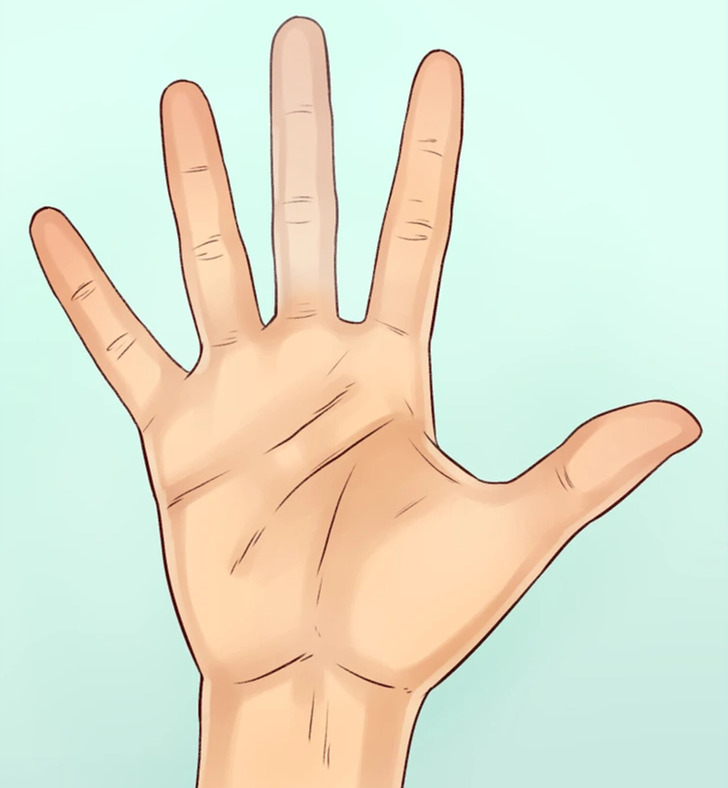
Raynaud’s disease makes parts of your body, like fingers and toes, feel numb and cold when it’s chilly or when you’re stressed. It happens because the small arteries that carry blood to your skin get narrow, reducing blood flow to those areas. This narrowing is called vasospasm.
Raynaud’s disease is more common in women than men and tends to affect people who live in colder places.
8. Floaters and flashes of light in eyes

See if you have floaters and flashes in your vision. Floaters can appear as small dark dots, squiggly lines, rings, or cobwebs. Flashes are like sudden bursts of light.
Floaters and flashes are common, especially among older people. They usually happen because of a harmless process called posterior vitreous detachment (PVD), where the gel inside your eyes changes. Sometimes, they can also be caused by retinal detachment, which is serious and needs treatment to prevent permanent vision loss. Floaters and flashes can also occur for no clear reason.
9. Puffy face
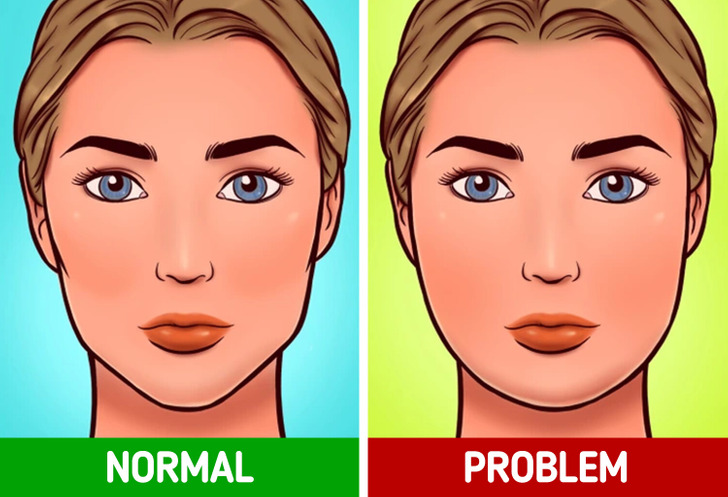
Sometimes, your face might swell up because of health issues like injury, infection, or allergies. Some of these reasons can be really serious.
You might wake up sometimes with a puffy face. This could happen if something pushes on your face while you sleep. But if your face gets swollen or puffy because of an injury or if it happens often, it could be a sign of a health problem.
Facial swelling isn’t just about your face; it can also affect your neck or throat. If your face swells up and there’s no injury, it could be a sign of a serious health problem. It’s best to have a doctor check it out.
10. Vivid dreams

So, why do we have intense dreams? Scientists aren’t totally sure, but they think a few things might be involved.
- When life gets tough, whether it’s problems with friends, family, school, or work, it can make us feel stressed or anxious. Big life events like getting married or buying a house can also lead to vivid dreams. Traumatic experiences, like losing someone close to us or being in a bad accident, can also cause intense dreams. Anxiety, especially, is linked to having scary and intense nightmares.
- Not getting enough sleep because of issues like insomnia or narcolepsy can make vivid dreams more likely. Changes to our sleep routine, like traveling to different time zones or not getting as much sleep as usual, can also increase the chances of having intense dreams.
- Some medicines, like certain antidepressants, blood pressure pills, and drugs for Parkinson’s disease or quitting smoking, have been linked to vivid dreams.
- Bad habits can lead to vivid dreams, often bad ones.
- Mental health problems like depression or schizophrenia, as well as physical illnesses like heart disease or cancer, can also cause intense dreams.
- Being pregnant can mess with our hormones, sleep, and emotions. Lots of pregnant women say they have really vivid dreams, especially in the early months of pregnancy.
Maintaining good health is essential for a happy, balanced life. When we’re physically and mentally well, we have the energy to pursue our goals, enjoy relationships, and engage fully in life. Prioritizing exercise, healthy eating, adequate sleep, and self-care practices lays the foundation for overall well-being and fulfillment.
Comments
Related Reads
“He Needs Surgery,” Fans Urge Tom Cruise to Get Anti-Aging Procedures, As He Is Deemed Unrecognizable at 61

I Refused to Put Up With My In-Laws Just Because We Owe Them

Tom Cruise Deemed Unrecognizable in New Pics With Prince William, as Some Say He Had “Too Much Surgery”

A Woman Who Won the “Ugliest Woman” Contest to Earn Money for Her Children
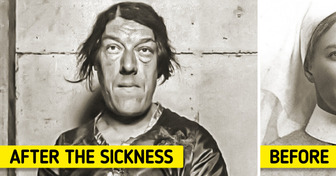
12 Endearing Secrets People on Reddit Revealed to Be Keeping From Their Partners

My In-Laws Humiliated Me in Front of the Whole Family—I Refuse to Swallow That

12 Wild Stories That Prove Cheating Isn’t For the Faint-Hearted

16 Plot Twists That Are More Unexpected Than a Barking Cat

12 People Share Their Most Disturbing True Stories, and We’re Thankful They Didn’t Happen to Us

My MIL Called Me a Gold Digger—But My Revenge Was Served Cold

“This Is the Best She Has Looked in Decades!” New Look of Donatella Versace Creates Buzz

I’m a Single Dad and My Friends Have Secret Plans for My Daughter—I’m Furious

